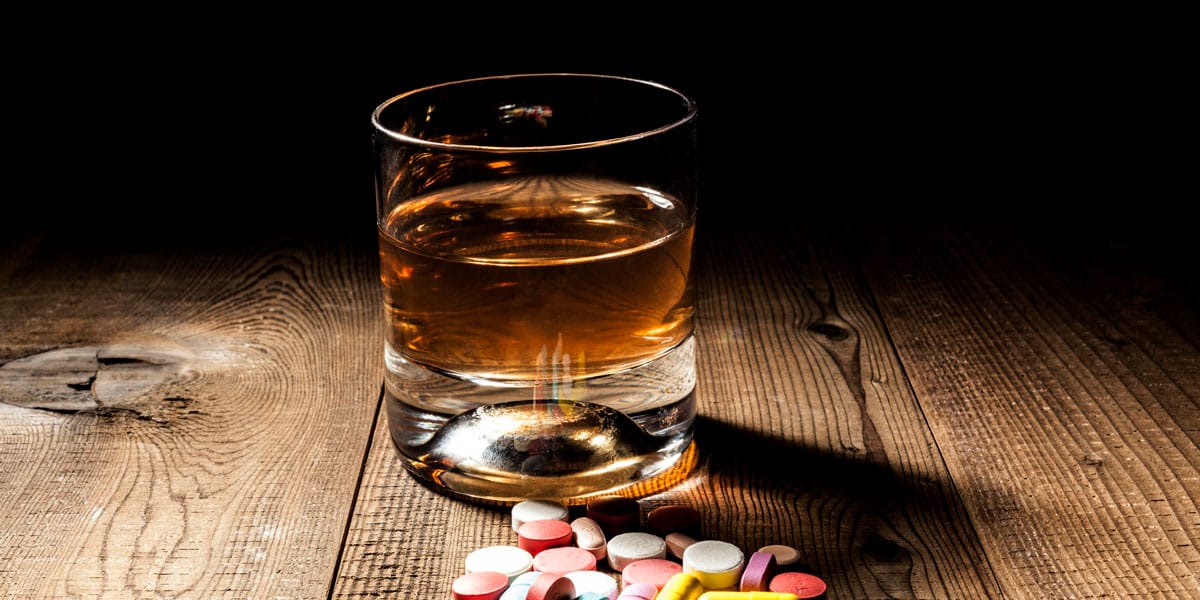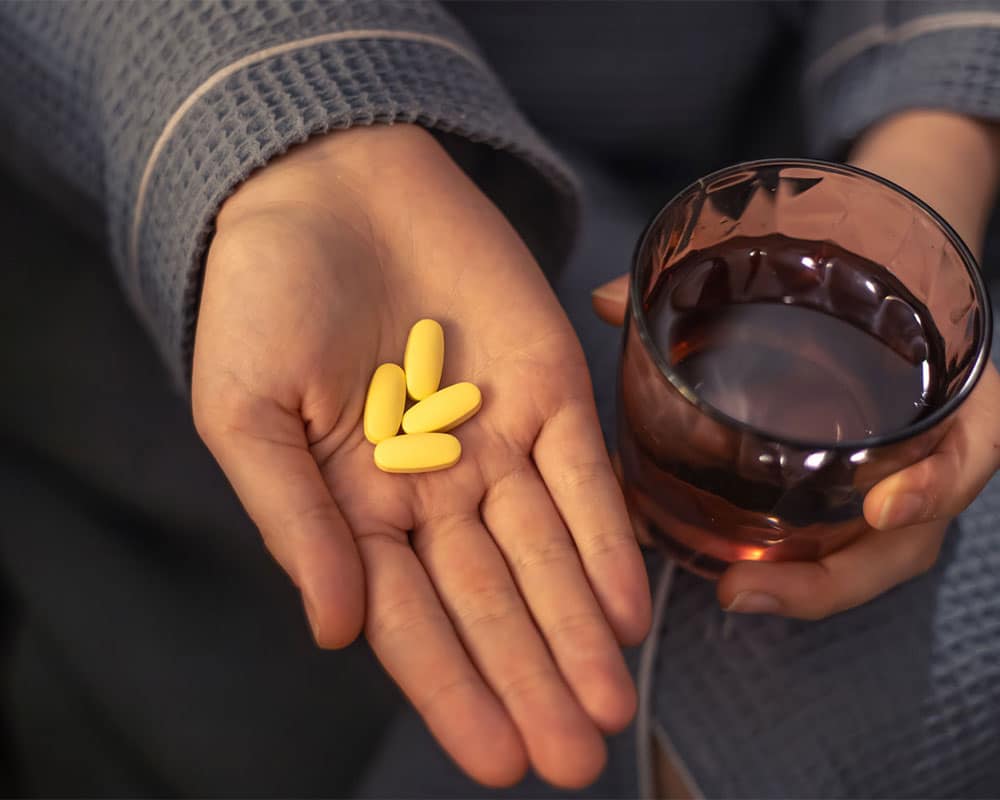Hydrocodone and Alcohol: Risks, Overdose Response, and More

- Both being potent depressants, hydrocodone and alcohol can have powerful side effects when combined.
- These side effects include slowed breathing, loss of consciousness, liver damage, drowsiness, and others.
- Knowing the warning signs of hydrocodone and alcohol overdose and how to react is crucial for safety.
Combining your regular dose of hydrocodone and alcohol is not recommended. Accidentally mixing these substances can happen, and when it does, you should consult your doctor right away or seek emergency medical attention.
What Is Hydrocodone?
Hydrocodone is a potent opioid painkiller (analgesic), frequently prescribed by healthcare providers to manage moderate to severe pain.[1] Typical applications of hydrocodone include the management of post-operative, injury, or chronic-condition-related pain.
Doctors often prescribe hydrocodone as part of combination formulations. Depending on the brand and product, hydrocodone may be combined with Vicodin, acetaminophen, and various inactive ingredients. Extended-release hydrocodone can provide longer-lasting results for patients who struggle with chronic pain.
This medication binds to opioid receptors in the brain and spinal cord.[2] When activated, opioid receptors block pain signals..[3] At higher doses, opioids can produce euphoric effects, which is one reason opioids are commonly misused and tightly regulated.[4]
Why Hydrocodone Is So Effective
The brain and body already come equipped with both opioid receptors and the chemical transmitters called endorphins that activate them.
Opioid medications like hydrocodone mirror these naturally produced endorphins, but with a greater intensity. When you take hydrocodone, the opiate receptors are flooded, producing potent and fast-acting results.[5] Due to the risk of dependence and addiction, this rapid onset and substantial effectiveness may come at a potentially serious cost.
Risks and Side Effects of Hydrocodone
When used as prescribed, the risk of experiencing severe side effects with hydrocodone is less than when the drug is misused, but the risk is still present.
Common side effects of hydrocodone include, but are not limited to, the following:[6]
- Drowsiness
- Nausea
- Constipation
- Skin rash
- Hearing loss
- Abnormal heart rate
- Respiratory depression (dangerously slowed breathing)
More serious side effects include addiction, overdose, and physical dependence.[7] Even when used as directed, many people develop a tolerance to hydrocodone. Over time, this increases the dosage required to achieve the same results. Continued increases lead to dependence, addiction, and a higher risk of overdose or serious side effects.
How Does Alcohol Affect the Brain and Body?
The majority of adults are aware from direct or indirect personal experience what alcohol intoxication looks like. Slurred speech, impaired judgment, delayed reactions, and other symptoms are common signs of excessive alcohol consumption.
How alcohol affects brain function, however, is not completely understood. Like hydrocodone, alcohol is a central nervous system depressant. When you drink, alcohol increases GABA (gamma-aminobutyric acid) and other neurotransmitter activity in the brain, which is what makes it a depressant.[8]
You can think of it as “turning the dial down” on key functions of the brain, including coordination, breathing, and basic thought processes. Alcohol’s depressive effect is much less specific than that of hydrocodone, affecting a wide range of the brain’s functions.
Understanding the Physical Effects of Alcohol
Alcohol’s impact on the brain is obvious, but it can also affect other organ systems throughout the rest of the body. For example, rapid alcohol consumption overtaxes the liver, changes heart rate, and depresses breathing. Especially when combined with hydrocodone, these effects can place extra strain on your organs.
What Happens When You Mix Hydrocodone and Alcohol?
Combining hydrocodone and alcohol creates what is called a synergistic effect. This means that the combination effect is greater than just adding the separate effects of the two substances. As such, you don’t need an overdose-level quantity of either substance to experience an extremely powerful, fast-acting, and dangerous cascade of negative consequences.
While a person under the effects of this combination can experience multiple potentially life-threatening issues, the main culprit in many fatal cases is respiratory depression. These two depressants have such a profound impact on the nervous system when combined that the brain stops telling the body to breathe.[9]
Combining hydrocodone with alcohol also places the liver under immense strain. The same enzymes your liver uses to process alcohol also metabolize hydrocodone. This means that both alcohol and hydrocodone will remain in your system for longer periods when combined, as these enzymes struggle to metabolize them.
Finally, the dangerous drops in blood pressure and/or sporadic heart rhythm changes many people experience after consuming hydrocodone with alcohol raise their risk of heart attacks or strokes.[10] This effect is compounded in people who are already at a higher risk of cardiovascular disease.
Medical Emergencies Associated With Hydrocodone and Alcohol
In addition to respiratory depression, combining hydrocodone and alcohol can cause several rapidly developing medical emergencies.
Loss of consciousness, complete disorientation, extreme drowsiness, and blue lips or fingernails (cyanosis) associated with this combination of drugs can indicate serious and immediate threats to the body.
Even when the above symptoms don’t directly cause hospitalization or fatal overdose, they will significantly increase your risk of getting into a deadly car accident, falling down stairs, falling off high ledges, or experiencing some trauma.
How Long After Taking Hydrocodone Should I Wait to Drink Alcohol?
Healthcare experts strongly advise against drinking any alcohol whatsoever while hydrocodone remains in your system. The half-life of hydrocodone is roughly four hours, meaning half of your original dose will be eliminated in that window of time.
Even with small or moderate doses, it takes the body considerably longer than four hours to clear your system of hydrocodone fully. Waiting a full 24 hours after your last dose is often recommended.
However, if you took an extended-release formulation or if your metabolism is slower, you may need to wait longer. Additional factors that can affect how long it takes your body to fully process your last dose of hydrocodone include liver function, kidney health, and other medications you may be taking.
Always consult with your primary healthcare provider when making decisions related to medication use and alcohol consumption.
Hydrocodone and Alcohol Toxicity: Signs, Consequences, and How to Respond
Being able to recognize the signs of hydrocodone and alcohol overdose can save lives, including your own. Even when consumed in small to moderate amounts, these substances can quickly cause a number of serious symptoms like those listed above.
What to Watch For
Blue lips, slowed or absent breathing, limpness or loss of consciousness, and poor (or no) reflexes in a person who ingested hydrocodone and alcohol indicate overdose. Especially with loss of consciousness and/or blue lips, you can’t wait for symptoms to improve.
How to Respond
Immediately contact emergency medical services (call 911) if you suspect an overdose. Keep the person awake if possible. Firmly rub on their breast bone (sternum) and shout their name to keep them awake. Administer nasal naloxone if it is available.
Stay on the line with 911 and follow their instructions while you wait for emergency services to arrive. Take note of the time and find out everything you can about how much alcohol and hydrocodone were consumed, at what time, any other substances involved, and other important details.
Find Hope and Healing With Professional Detox and Rehab Services
No matter how long you or your loved one has been struggling with alcohol and hydrocodone, it’s never too late to get the treatment you need for a full recovery. Thousands of people have turned to detox and rehab services to recover from their dependence, and you can too.
If you or someone you care about is struggling with prescription drug and alcohol use, find an accredited treatment program and invest in a healthier and more optimistic future.
Frequently Asked Questions About Hydrocodone and Alcohol

